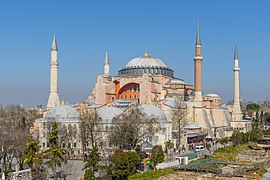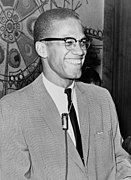Portal:Islam
| Al-Islam Portal | What is Islam? | Indices | Wikiproject | Categories |
|
Wikipedia portalsIslam is an Abrahamic monotheistic religion centered on the Quran and the teachings of Muhammad, the religion's founder. Adherents of Islam are called Muslims, who are estimated to number approximately 1.9 billion worldwide and are the world's second-largest religious population after Christians. Muslims believe that Islam is the complete and universal version of a primordial faith that was revealed many times through earlier prophets and messengers, including Adam, Noah, Abraham, Moses, and Jesus. Muslims consider the Quran to be the verbatim word of God and the unaltered, final revelation. Alongside the Quran, Muslims also believe in previous revelations, such as the Tawrat (the Torah), the Zabur (Psalms), and the Injil (Gospel). They believe that Muhammad is the main and final Islamic prophet, through whom the religion was completed. The teachings and normative examples of Muhammad, called the Sunnah, documented in accounts called the hadith, provide a constitutional model for Muslims. Islam is based on the belief in oneness and uniqueness of the God (tawhid), and belief in an afterlife (akhirah) with the Last Judgment—wherein the righteous will be rewarded in paradise (jannah) and the unrighteous will be punished in hell (jahannam). The Five Pillars—considered obligatory acts of worship—are the Islamic oath and creed (shahada), daily prayers (salah), almsgiving (zakat), fasting (sawm) in the month of Ramadan, and a pilgrimage (hajj) to Mecca. Islamic law, sharia, touches on virtually every aspect of life, from banking and finance and welfare to men's and women's roles and the environment. The two main religious festivals are Eid al-Fitr and Eid al-Adha. The three holiest sites in Islam are Masjid al-Haram in Mecca, Prophet's Mosque in Medina, and al-Aqsa Mosque in Jerusalem. The religion of Islam originated in Mecca in 610 CE. Muslims believe this is when Muhammad received his first revelation. By the time of his death, most of the Arabian Peninsula had converted to Islam. Muslim rule expanded outside Arabia under the Rashidun Caliphate and the subsequent Umayyad Caliphate ruled from the Iberian Peninsula to the Indus Valley. In the Islamic Golden Age, specifically during the reign of the Abbasid Caliphate, most of the Muslim world experienced a scientific, economic and cultural flourishing. The expansion of the Muslim world involved various states and caliphates as well as extensive trade and religious conversion as a result of Islamic missionary activities (dawah), as well as through conquests. (Full article...) Selected article
Allah (/ˈælə, ˈɑːlə, əˈlɑː/; Arabic: ﷲ IPA: [əɫ.ɫɑːh] ) is the Arabic word for God, particularly the God of Abraham. Outside of the Middle East, it is principally associated with Islam, but the term was used in pre-Islamic Arabia and continues to be used today by Arabic-speaking adherents of any of the Abrahamic religions, including Judaism and Christianity. It is thought to be derived by contraction from al-ilāh (الاله, lit. 'the god') and is linguistically related to God's names in other Semitic languages, such as Aramaic (ܐܲܠܵܗܵܐ ʼAlāhā) and Hebrew (אֱלוֹהַּ ʾĔlōah).
The word "Allah" now implies the superiority or sole existence of one God, but among the pre-Islamic Arabs, Allah was a supreme deity and was worshipped alongside lesser deities in a pantheon. When Muhammad founded Islam, he used "Allah" to refer to the same unitary God who met Abraham, according to the Bible and the Quran. Many Jews, Christians, and early Muslims used "Allah" and "al-ilah" interchangeably in Classical Arabic. The word is also frequently, albeit not exclusively, used by Bábists, Baháʼís, Mandaeans, Indonesian Christians, Maltese Christians, and Sephardic Jews, as well as by the Gagauz people. While it is an Arabic word and has historically been used by Muslims and non-Muslims alike in the Arab world, the usage of "Allah" by non-Muslims has been controversial in non-Arab parts of the Muslim world, especially Malaysia, where it became illegal for non-Muslims to use "Allah" after the country experienced a social and political upheaval in the face of the word being used by Malaysian Christians and Sikhs. (Full article...) Featured picture 1905 Stereoscope. Original caption reads: The native mode of grinding coffee, Palestine. In this month
In the newsSelected biographyMuhammad ibn ‘Abdullāh ; also spelled Mohammed or Muhammed) (ca. 570 Mecca – June 8, 632 Medina), is the central human figure of the religion of Islam and is regarded by Muslims as a messenger and prophet of God (Arabic: الله Allāh), the last and the greatest law-bearer in a series of prophets of Islam. Muslims consider him the restorer of the uncorrupted original monotheistic faith (islām) of Adam, Abraham, Moses, Noah, Jesus and other prophets of Islam. He was also active as a diplomat, merchant, philosopher, orator, legislator, reformer, military general, and, according to Muslim belief, an agent of divine action. Born in 570 CE in the Arabian city of Mecca, he was orphaned at a young age and brought up under the care of his uncle. He later worked mostly as a merchant, as well as a shepherd, and was first married by age 25. Discontented with life in Mecca, he retreated to a cave in the surrounding mountains for meditation and reflection. According to Islamic beliefs it was here, at age 40, in the month of Ramadan, where he received his first revelation from God. Three years after this event Muhammad started preaching these revelations publicly, proclaiming that "God is One", that complete "surrender" to Him (lit. islām) is the only way (dīn) acceptable to God, and that he himself was a prophet and messenger of God, in the same vein as other Islamic prophets. Did you know...
WikiProjects
Ahmadiyya • Shi'a Islam • Sunni Islam • Hadith • Salaf • Muslim scholars • Islam and Controversy • Muslim history • Mosques • Links Cleanup
Early Muslim military history task force What are WikiProjects? Selected quoteTopicsBeliefs and practices: Oneness of God • Profession of Faith • Prayer • Fasting • Pilgrimage • Charity Major figures: Muhammad • Abu Bakr • Umar • Uthman • Ali • Companions of Muhammad • Household of Muhammad • Prophets of Islam • Shia Imams Texts & Laws: Qur'an • Hadith • Sharia • Jurisprudence • Theology • Biographies of Muhammad Branches of Islam: Sunni • Shi'a • Sufi • Ibadi • Quranism • Sociopolitical aspects: Academics • Philosophy • Art • Science • Architecture • Calendar• Holidays • Women in Islam • Leaders • Politics • Islamic Peace • Jihad • Liberalism • International Freedom Alliance • Islamophobia
Featured content
Featured articles
Featured listsGood articles
Featured pictures
Featured portalsGood topics
Things you can doRelated portalsAssociated WikimediaThe following Wikimedia Foundation sister projects provide more on this subject:
|



































